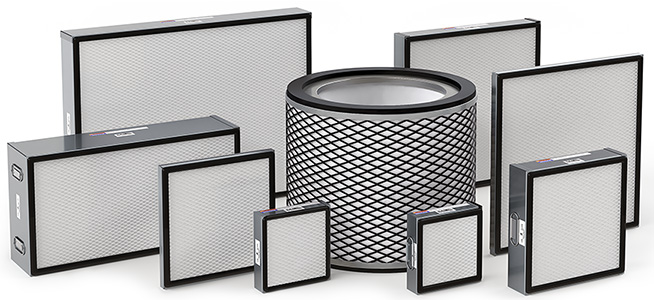Activated Carbon Filters
- Activated Carbon Filters
- How does an activated carbon filter work?
- How long do activated carbon filters last?
- Activated Carbon Filter Uses
Activated Carbon Filters
Activated carbon filters, or activated charcoal filters, control fumes and odors particularly from chemical processes, outdoor air pollution, and smoke. These filters are comprised of block, or small pieces of carbon that have been treated to increase the surface area to become more porous to adsorb chemical fumes1. Having a large surface area allows the activated carbon to work more effectively than regular carbon making it a great choice for filter media. The efficiency of these filters depend on the chemical being adsorbed and the application.
Carbon is the leftover charred product of heating a substance such as coconut shells. In order for carbon to become activated, additional processing is completed to increase the porosity of the surface. The carbon is injected with hot carbon dioxide or steam to create tiny pores on the surface. The more pores, the more effective the carbon is at bonding to harmful chemical fumes2.
How does an activated carbon filter work?
Activated carbon filters use the millions of pores and large surface area to remove harmful chemicals in the area through adsorption. During the activated carbon adsorption process, compounds in the air react with the carbon to stick to the surface area effectively removing the contaminant from the air1. Adsorption is different from absorption in form, that the pollutants stick to the outside of the carbon and are not contained within the structure2.
How long do activated carbon filters last?
Activated carbon filters become saturated over time and must be replaced to optimize efficiency. The amount of time an activated carbon filter lasts depends on the purpose, how often the filter is being used and the chemical being adsorbed. If an activated carbon filter is not replaced soon enough, the filter will start releasing chemicals that were adsorbed in order to adsorb new ones. Usually if the filter is giving off an odd smell, it can be an indicator that it is time to change the filter2.
Activated Carbon Filter Uses
Activated carbon filters can remove volatile organic compounds when HEPA filters alone don’t work adequately. Fumes from painting and cleaning products as well as cigarette smoke can be removed with an activated carbon filter2. However, in order to remove particulate and chemical fumes, activated carbon filters should be used in conjunction with HEPA filters to provide the best solution.
In our specific case, Sentry Air Systems activated carbon filters remove unwarranted chemicals and contaminants from air and gaseous streams, and in most cases not used in water applications.
Request a Quote
Sources
- Activated Carbon Filters: What They Are & How They Work. Allergy & Air. 2014 May 7.
- Myers Jr., Philip D. Activated Carbon Air Filters: Everything You Need to Know. Molekule. 2018 Jan 31.

 Made in the USA
Made in the USA